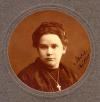
Cherubina de Gabriak
Born in March 31, 1887 / Died in December 5, 1928 / Russian Federation / Russian
Cherubina de Gabriak poet from Russian Federation was born on March 31, 1887, had 41 years and died on December 5, 1928. Poems were written mainly in Russian language. Dominant movement is political.
Biography
Cherubina de Gabriak was a literary pseudonym of Elisaveta Ivanovna Dmitrieva; March 31, 1887 – December 5, 1928), possibly together with Maximilian Voloshin.
In August 1909, the famous Russian artistic periodical Apollon received a letter with verses on a perfumed paper with black mourning edges, signed only by a single Russian letter Ch. The verses were filled with half-revelations about its author—supposedly a beautiful maiden with dark secrets. The same day a woman with a beautiful voice phoned the journal's publisher Sergei Makovsky and arranged for publication of the verses. Over the next few months, publications of the newfound poetic star were the major hit of the magazine, and many believed that they had found a major new talent in Russian poetry. The identity of the author was slowly revealed: her name was Baroness Cherubina de Gabriak, a Russian-speaking girl of French and Polish ancestry who lived in a very strict Roman Catholic aristocratic family, who severely limited the girl's contacts with the outside world because of an unspoken secret in her past. Almost all of Apollon’s male writers fell in love with her, most of all the great poet Nikolai Gumilyov. He wrote a series of passionate love letters to her and received quite passionate answers.
The fame of the newfound genius was short-lived. In November it was discovered that Baroness Cherubina de Gabriak did not exist at all, and the verses were written by a disabled schoolteacher, Elisaveta Ivanovna Dmitrieva, with the participation of a major Apollon contributor and editor, the poet Maximilian Voloshin.
Apparently Sergei Makovsky had rejected several of Dmitrieva's
verses; and Voloshin, who knew his publisher quite well, invented the
legend about Cherubina. There is still controversy about the correct
attribution of Gabriak's corpus. Most contemporaries, including all of Apollon’s
critics, were certain that all the verses and most of the letters were
written by Voloshin himself; after all, they claimed, Cherubina was a
first-rank poet and Dmitrieva was not. Both Elisaveta Dmitrieva and
Maximilian Voloshin claimed that the verses were all Dmitrieva's, and
that Voloshin only selected them and suggested themes and expressions.
Modern researchers tend to support attribution of the verses to
Dmitrieva, as they are quite similar to her later works.
The real author of Gabriak's poetry, Elisaveta Dmitrieva, was born on March 31, 1887. Between 1890 and 1903 she suffered from tuberculosis of the bones and was left lame and barely able to walk.
She studied old French and Spanish literature at Saint Petersburg State University, and published some verses both before and after her Gabriak period but without much success. In 1911 she married Vasiliev, an engineer, and took his last name.
In the early 1920s, she worked with poet and translator Samuil Marshak on theatrical plays for children. Later she also published prose and translations.
Starting from 1921, she was searched and interrogated by the State Political Directorate along with other members of the Anthroposophic Society. Finally in 1927 she was exiled to Tashkent where she died in 1928 of liver cancer. Shortly before her death, she was visited in Tashkent by her friend Sinologist Yulian Shchutsky and wrote, influenced by him, 21 poems attributed to Li Xiang Zi, a fictional Chinese poet exiled for his "belief in immortality of human spirit". The name of Li Xiang, invented by Shchutsky, means "a house under a pear tree", where Dmitrieva indeed lived in Tashkent. The name, Cherubina, was taken from the story A Secret Of Telegraph Hill by Bret Harte. The last name, Gabriak, was derived from Gabriakh, the name of a toy, a wooden imp, presented by Voloshin to Elisaveta Dmitrieva. Voloshin found the name Gabriakh in the book Demonomanie des Sorciers by Jean Bodin, where it belonged to an imp, protecting people from evil spirits.[1]





